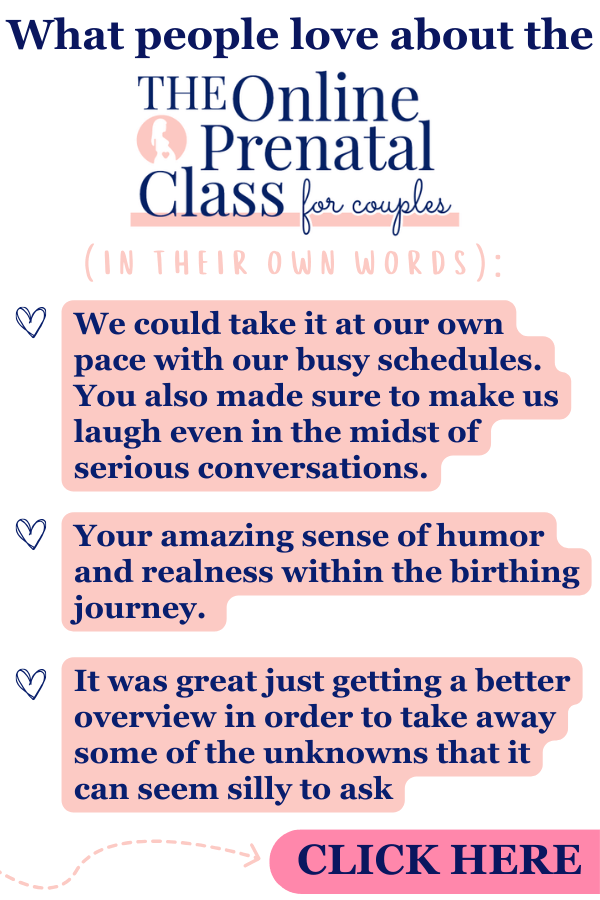👋 I’m so glad YOU are here. Are you looking to also get your partner prepared? This is for BOTH of you. Couples just love it and I know you want to both feel prepared!
Is a birthing class really necessary? It seems like you have SO much to do during your pregnancy, expectant mothers have a hard time prioritizing what they really need to do. Should expectant parents plan on taking a birth class? Will a new mom’s birth be worse if they don’t take a class?
But, before we get started, I’d love to introduce myself and how I might know a lot about this.
Hi — I’m Hilary — The Pregnancy Nurse 👩⚕️. I have been a nurse since 1997 and I have 20 years of OB nursing experience, I am also the curly head behind Pulling Curls and The Online Prenatal Class for Couples. 🩺 I have taught classes in person for my hospital as well. I have helped thousands of parents go through the experience and seen plenty of families who did or did not take a class. I’m an expert on this.
Do I Need To Take a Birth Class?
It’s easy to think that a childbirth classes are a step you can skip. However, online classes have created a new era in childbirth education. You can fit an online course into a busy life by watching the smaller videos as you’re able to. YES, take a birth class. You won’t regret it, as long as you pick the right one.
Many courses offer a guarantee that you’ll enjoy them and feel more prepared afterwards.
What do the studies show about childbirth preparation?
I find this FACINATING.
Did you know that people who take a prenatal class are 10% less likely to have a cesarean section? Learn more about that statistic here.
I also chat about them in this video:
When I found this out I was SHOCKED, and it really didn’t make sense. But the more I thought about it — I think three things put these couples at an advantage:
- They understand how important movement is in the process, and will move instead of remaining in fear.
- They understand the process, and that it can take a while, rather than throwing in the towel when it’s not like the movies
- They communicate with their birth team better, which is a huge advantage!
Ok, but….
How do you pick the right birth class:
Pick the Right Instructor
There are a lot of childbirth educators out there hoping to tell you how to create your birth plan. Pregnant women & families should look at their qualifications before picking a class from them:
Doula: There is no qualifications for being a doula. While there are certification programs, many doulas do not do them (in fact, many of the best ones I’ve worked with). It will be hard to ascertain how much experience they have just from this credential.
Lactation Consultant: These educators are trained in breastfeeding, and often extend their knowledge to the labor room. Personally, I don’t teach a breastfeeding class (but offer many through my course at a great rate) — and I’d prefer to take my prenatal class from someone with lots of delivery experience rather than breastfeeding experience. These educators can be certified as a lactation educator, lactation counselor, or an IBCLC.
Childbirth Educator: There are some certification programs out there (to be a certified childbirth educator), but many people just call themselves a childbirth educator. Again, difficult to ascertain experience with this credential
Registered Nurse: An RN has to go through a certified program, pass it and also take the NCLEX exam before she is a licensed as an RN. If that RN has worked as a labor and delivery nurse, you can be sure that she has had hours of training and classes to prepare her for that role. Reputable RN’s will also state how many years they have worked in labor and delivery.
Most labor RN’s agree it takes 5-8 years of experience in labor and delivery until you are truly comfortable as a labor nurse. I have seen birth classes taught by other types of nurses, but I’d recommend to find one taught by a delivery nurse for the best information for you.
And yes, I’m a registered nurse with 20 years of experience who has her own prenatal class (one of the first online classes out there, actually). But I do want you to find one that’s a good fit for you. I just wanted you to know my bias. I do think my class it the best one on the internet though. And I don’t say that lightly.
Physician: There are some doctors who are teaching prenatal classes anymore. If they have MD or DO behind their name, you can be sure that they have passed medical school. They should also share where they did their residency. They should also share if they are board certified in a specific area. The best would be to find one that is a board certified OBGYN.
I have also seen birth classes taught by personal trainers or physical therapists. As far as I know these have no training in the labor room as I have seen neither in my 20 years at the bedside. While they likely have some good input in using your body both during and after pregnancy, I doubt they will prepare you well for actual delivery.
I would think of this type of class as a supplemental class. I’d also MUCH prefer one from an actual physical therapist rather than a personal trainer as pregnancy does a lot to our muscles and joints and they could be very helpful, as long as they are very knowledgeable.
Find Out What Is Taught
The class should cover a surface level of knowledge on several topics. There is no need to know how to deliver your baby on your own — you just want to have a good idea of what to expect, and why they are doing basic things so you are not caught off guard:
Basic Medical Interventions
What are some very normal interventions that may go on. Things like increasing your IV, stopping any Pitocin and rotating you are things every labor nurse does any time there is an issue, a class should cover those things so you aren’t nervous.
How to know if you’re in labor
A good class is going to go over the MANY signs of labor that will likely be happening to your body so you can make a mental checklist of what’s going on (rather than just being apalled your body is acting out against you)
What to expect during your hospital stay
The details about how you’ll check in and what will happen from the minute you meet your nurse don’t vary much from hospital to hospital, but knowing those first steps will make you very comfortable moving forward
What happens during a vaginal birth?
You should know what to expect as far as pushing and who will be in the room, as well as common questions you’ll be asked about your wishes in this area. Going over the stages of labor will help you to know what to expect as your body moves through this natural process (that likely won’t feel very natural). Baby’s birth may seem very foreign, and scary. But a good childbirth class will put you at ease that all these things are normal (if not feeling that way).
How to communicate with your healthcare team
One of the hardest things for families to do is to talk with their provider about the information they need to make decisions, as well as how to stop things if it is against their wishes. Learning to talk to their provider in a respectful collaborative manner makes families feel like part of the time, rather than an outsider.
Natural Pain Management & Relaxation Techniques
Beyond labor there are a lot of times you’ll need to manage some pain in your life as a pregnant or new mom. Learning these techniques will serve you well as you move forward. Whether you use them entirely for your labor, or just supplement other medical interventions will be up to you. Teaching your partner comfort techniques can be an important thing for both of you.
Pain management options
In addition to natural pain management, are there other options — and what do those look like. What should you expect from them and pain medication.
Cesarean Birth
Your instructor should have a good amount of experience in all areas of birth.
What life is like postpartum
A realistic look of what to expect from your body and your baby after delivery is a helpful piece of information for new parents. Many people are caught off guard by this time because it isn’t talked about as openly as we should. Learning what a normal postpartum life looks like from an expert will only aid you in your recovery. A bit of newborn care can be helpful as well. Baby care can be off-putting for new parents (especially dad) so some basic information makes for a good time.
A great way to learn what is covered in a class is to look at the page where you purchase it. A good online childbirth class should have a section that shares what it covers for your big day.
What a birth class won’t cover:
Your specific medical condition may or may not be covered. I tend to cover about 98% of birth, but if you are seeing a high risk doctor for a specific thing, your time with them is your education on that (but, the rest of birth will be very similar for you).
Is the Class a Fit For You?
What kind of birth do you want?
Do you want a “natural birth”, or are you hoping to get an epidural? While this SEEMS like the right questions to ask, in reality you should learn about both. Birth is a complicated process which we actually have very little control over, so having knowledge about both can serve you well — and improve your birth experience.
Where do you plan to birth?
Are you planning a home birth or a birth center birth? You’ll want a class that caters to that. However, if you are planning on a hospital birth, you’ll want one based on that. They truly are different processes and you’ll want to look at what you’re planning on. Keeping in mind that many birth center births end up happening at a hospital due to a variety of reasons. So, learning about hospital birth might not be a bad plan as well.
How involved do you want your birth partner?
Are you hoping to learn alone, or are you hoping to involve your birth partner in the process. Find a class that involves them (and is meant for them too) to make them feel welcome learning about the birth process. A helpful support person will be well worth the time you spend together!
What is your budget?
There are a lot of classes out there anymore at many price points. Set a budget that you’d like to stick to for your classes and find one that fits that (and is taught by someone with experience). There are a lot of price points out there.
How much time do you have?
Is this class meant to be done daily, or can you just do it as you have time. While it might seem great to have a class that takes hours and hours (so that you’re getting lots of information) many people truly only want a few hours of information and to feel prepared in that timeframe.
Be realistic about how much time you’d like to use in preparation for this.
Do you want an online course or in person classes?
I have taught both, and I ultimately prefer online courses for a number of reasons:
- You can fit it into your schedule more easily (many are offered on demand)
- You can re-watch areas that you had a question on
- Nothing is ever forgotten in these classes or skipped over
- Much easier for partners to do together
However, if you feel like the online format isn’t something that will work for you (I’d try a free class first to see if you like it) definitely start trying to find a class in your second trimester, if not before. Check your local hospital or birth center to see if they offer them.
When is the best time to take a childbirth class
Ultimately, the best time is the time that you will do it. I normally recommend early in your third trimester, but having your class picked out at around 25 weeks. However, even if you’re further in your pregnancy you can still fit a class in. Even if your due date is just in a few weeks or days, you can still do it!
Do second time moms need a childbirth class?
A LOT of parents love taking a refresher course, especially if they didn’t have the birth experience they wanted with their first baby. Find a well-priced one you can do quickly, because I know you moms are busy!
First time parents tend to have more questions, and may want to dive into the information more deeply, and that’s fine too.
What happened to Lamaze classes or Bradley Method Classes?
When your mom had a baby these were totally the birthing classes people picked between. However, with more educators with their own clases, they aren’t the “standard” they used to be. While both are still offered, the best way is to find a class and instructor that works for you.
So, now that we’ve gone over ALL of this, can I sit next to you and tell you that things will really be different if you have taken a class. I’ve sat at thousands of bedsides of moms wishing they’d had more information in advance. So many speak of birth trauma that they wouldn’t have had to endured if they had just taken the right class.
I do believe my class is that class for you, but if it doesn’t seem like a good fit — please find one that is the right fit for you.
My class:
- Is taught by an RN with 20 years of experience in Labor and Delivery plus had 3 of her own children
- Was one of the first hospital-based classes on the internet, and is still one of the best
- Can be done in just a few hours
- Is meant to be done with your partner so you create a unbeatable birth team!
I hope I’ll see you inside. Any questions, please ask them in the comments.
Want to do a vibe check before diving into the whole thing with me? — check out my free labor pro tips. It’s your first step toward getting in the driver’s seat of your birth.






 Midwife Pro’s and Con’s
Midwife Pro’s and Con’s
